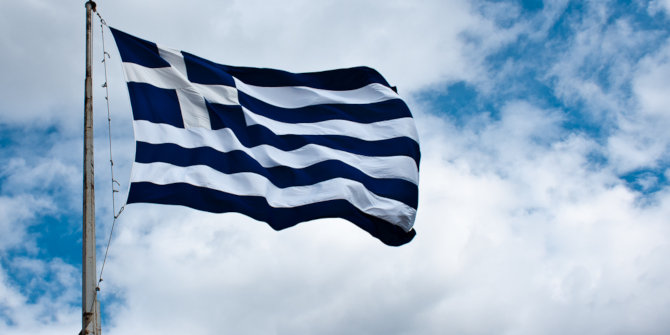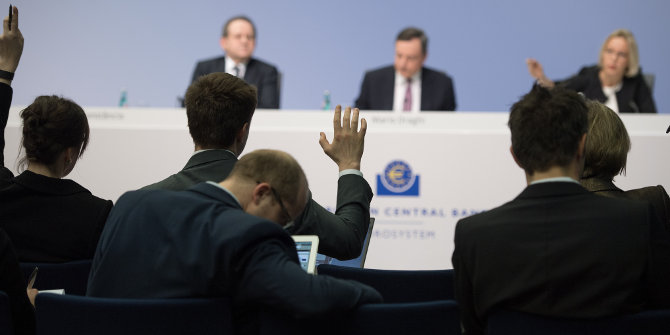
 The banning of the ‘burkini’ by a number of French municipalities has generated heated discussion about the nature of secularism in France. George Kassimeris and Leonie Jackson write that the burkini ban, alongside attempts to restrict the use of religious symbols and clothing in other European countries, demonstrates the unequal cultural power that shapes the lives of Muslims in Europe, where the entitlement to feel ‘comfortable’ is deemed more important than Muslim women’s right to veil.
The banning of the ‘burkini’ by a number of French municipalities has generated heated discussion about the nature of secularism in France. George Kassimeris and Leonie Jackson write that the burkini ban, alongside attempts to restrict the use of religious symbols and clothing in other European countries, demonstrates the unequal cultural power that shapes the lives of Muslims in Europe, where the entitlement to feel ‘comfortable’ is deemed more important than Muslim women’s right to veil.
Images of armed police supervising the undressing of a Muslim woman on a Nice beach have gone viral in the last few days. The officers were apparently upholding the ban on the ‘burkini’, a swimsuit that covers the legs, arms and hair, and is contentious because of its religious connotations, read as provocative to the secular values of the French state.
The woman in these widely shared images was not wearing the ‘burkini’, but a headscarf, leggings and tunic, which she was forced to remove as four police officers stood over her. The power dynamics in this image could hardly be more stark, but the disapproval, suspicion and coercion involved are an everyday and mundane reality for many Muslim women across Europe. Constantly commanded to integrate, at the same time as being admonished for not doing so correctly, contemporary Islamophobia regularly constructs Muslims as objects; to be disciplined and controlled by those entitled to decide, supervise and direct the level of acceptable integration.
French commitment to laïcité means that state attitudes to religious symbols are bluntly hostile. Yet, we need only consider Jack Straw’s famous intervention into the ‘veil debate’ in the UK to remember that the construction of Islamic dress as contentious is a widely shared narrative across Europe. In 2006 Straw, a former justice secretary and then a Labour MP for Blackburn, reflected on a meeting with a veiled constituent who, although on most levels integrated (in terms of accent and education), made him question the common bonds that the veil seemed to sever. In an article for the Blackburn-based Lancashire Telegraph, which prompted a debate, he wrote: “Above all, it was because I felt uncomfortable about talking to someone “face-to-face” who I could not see. So I decided that I wouldn’t just sit there the next time a lady turned up to see me in a full veil, and I haven’t… I can’t recall a single occasion when a lady has refused to lift the veil; most seem relieved”.

Framing the veil as a sign of separation, the French, like Jack Straw before, have marked it as a difference that exceeds their level of tolerance and resolved to no longer accept this state of affairs by henceforth requesting that veils be removed. However, such decisions are being formulated, and their consequences acted out, from a position of cultural power where the entitlement to feel ‘comfortable’ is deemed more important than Muslim women’s right to veil.
If the veil is constructed as a mark of separation and difference, then its removal becomes a nod towards integration and similarity, but its meaning in British or French society must not be decided a priori. The ‘burkini’ was designed to widen and encourage the participation of Muslim women in beach culture in much the same way that the veil acts, for some, as a way to retain principles of Islamic modesty while taking part in everyday activities.
It is somewhat ironic that the very articles of clothing that encourage comfortable participation in European societies are being marked out as so dangerous to these societie’ values that they must be removed. There is no more naked display of this power than the image of armed police forcing a peacefully reclining woman to undress. To empathise with her it is necessary to imagine the psychic rupture involved when, enjoying the mundane activity of lying on a beach, one is forced to come to terms with one’s construction as an object whose very presence disturbs the order of things.
The decision by France’s State Council court that the ‘burkini’ ban is plainly illegal is welcome. But decriminalising clothing is not the central issue. We must disentangle values from cloth in order to understand that coercive undressing does not always require an armed officer to direct it.
Please read our comments policy before commenting.
Note: This article gives the views of the authors, and not the position of EUROPP – European Politics and Policy, nor of the London School of Economics.
Shortened URL for this post: http://bit.ly/2bWTGGb
_________________________________
 George Kassimeris – University of Wolverhampton
George Kassimeris – University of Wolverhampton
George Kassimeris is Professor of Security Studies at the University of Wolverhampton. He tweets @gkassimeris
–
 Leonie Jackson – University of Wolverhampton
Leonie Jackson – University of Wolverhampton
Dr Leonie Jackson is based at the University of Wolverhampton and specialises in Security Studies.






What are you arguing for / against ?
Most people in the UK seem to agree that LAWS dictating everyday public dress are unwelcome.
Many people in the UK support requirements to show faces in specific circumstances, including; in Court, at School, nursing (personal care) and certain other situations when identity is relevant and reasonable.
Many people would agree with Jack Straw that an MP (amongst others) should be entitled to ask to see a face without falling foul of any discrimination laws. (Most MPs can accommodate a chaperone if desired.)
Employers should be allowed require face-revealing. e.g at interview or when dealing with the public.
There MAY be work-tasks when it can be demonstrated that a face-veil could get tangled in machinery and banned (along with dangling crosses)
Some people would argue that, while the law should stay out of clothing, we are entitled to express disapproval (civily) of face-covering if it appears to be symbolic of gender-oppression.
This is NOT to give license to abuse a face-covered women walking by herself along the street.
Are these distinctions so hard ??
It is unfortunate that worshiping at the Altar of Tolerance allows for the suppression of women and women’s rights. To say that a female voluntarily and willingly wears a burqa practically 24/7 when they are outside of the house (even in the oppressive heat of the desert) is not credible. This occurs because of male suppression of women. And as these men force their wives/daughters to dress this way, they themselves are free to stare/gawk at European women in bikinis (or less, depending on the specific beach). Perhaps if the males also wore burkinis, then a better argument could be made that it is a cultural/religious form of dress; but they do not. The foundation of this dress is the caveman-like concept of male superiority and female inferiority; this ideology is incompatible with modern civilization (just as slavery is incompatible with modern civilization) . We in the West believe in equality of ALL people.
That being said, the burqa/burkini should not be banned though, as there is a place for it in museums.
“To say that a female voluntarily and willingly wears a burqa practically 24/7 when they are outside of the house (even in the oppressive heat of the desert) is not credible.”
This is an extremely ill-informed statement – of course some women veil out of choice. If you want to protect Muslim women’s interests (which I highly, highly doubt given the nature of your comments) then you could start by asking them what they want instead of believing in folk tales about oppressed women forced to wander through the desert in a full burqa.
We in the West do believe in equality of all people, including Muslims. That’s what makes the persistent anti-Muslim rhetoric we see from a minority of right-wingers so completely at odds with western values.
My comment stated the word “burqa”, it didn’t use the word “veil”. For instance, the hijab shows the face, thus it does not hide the female from society which allows her to be part of society. Alternatively, the burqa (and to a lesser extent, the niqab) hides the female from society, which are male mechanisms to suppress and demean the wife/daughter. It is about power, it is not about religion.
Is it your position that women wear burqa’s voluntarily?
Some women do, some don’t. Hence your ridiculous over-generalisation – that essentially every woman who wears a burqa is being exploited – is nonsense. But of course you’re clearly operating from the typical standpoint of having intolerance for Muslims and dressing that up in a disingenuous concern for women’s rights. As an argument it’s about as boring as it gets.
I am very intolerant to female exploitation, and I am proud of that. That is the peril of absolute tolerance, in that people tolerate things (such as female exploitation) just because it has existed for a millenium, and they are too afraid to offend someone.
Also, the burqa (or the chador, niquab, etc…) has no foundation within the text of the Koran, rather, it is a male creation forced upon females to pursue their own illusion of male superiority (which is complete fiction). Rather, it is specific males’ own sense of inferiority that compels them to oppress a female so to make them feel superior. It has nothing to do with religion.
And as for it being voluntarily worn, it is hardly credible that (for example) the young kidnapped Chibok girls voluntarily chose to wear that outfit. Is it your position that the tolerant members of Boko Haram who kidnapped them somehow gave the girls the option of which clothing to wear? Is it your position that all of the kidnapped girls chose to not wear (for example) jeans, or a sundress, or shorts, and instead dress the way they did by unanimous decision? Not even one girl wore (for example) pants. Why? Can it be true that the males are suppressing the girls with that outfit (not too mention there opposition to the girls getting educated)? It is no coincidence that that outfit is a symbol of repression.
This kind of so-called Islamophobic rhetoric is very dangerous indeed. It legitimises the oppression of women and perpetuates the sanctity of outdated religious doctrine. Veiling is repression and will never be an act of equality. It is derived from dominance and suppression.
Perhaps if the men also wore a burqa or niqab or veil, only then would the argument be weakened that women are being suppressed; but until then, it goes without saying that it is a tool of suppression of women.
as a Muslim women veiling is my choice it emperers me. I do not want men doing sex to me becorse I have revealed my bodie